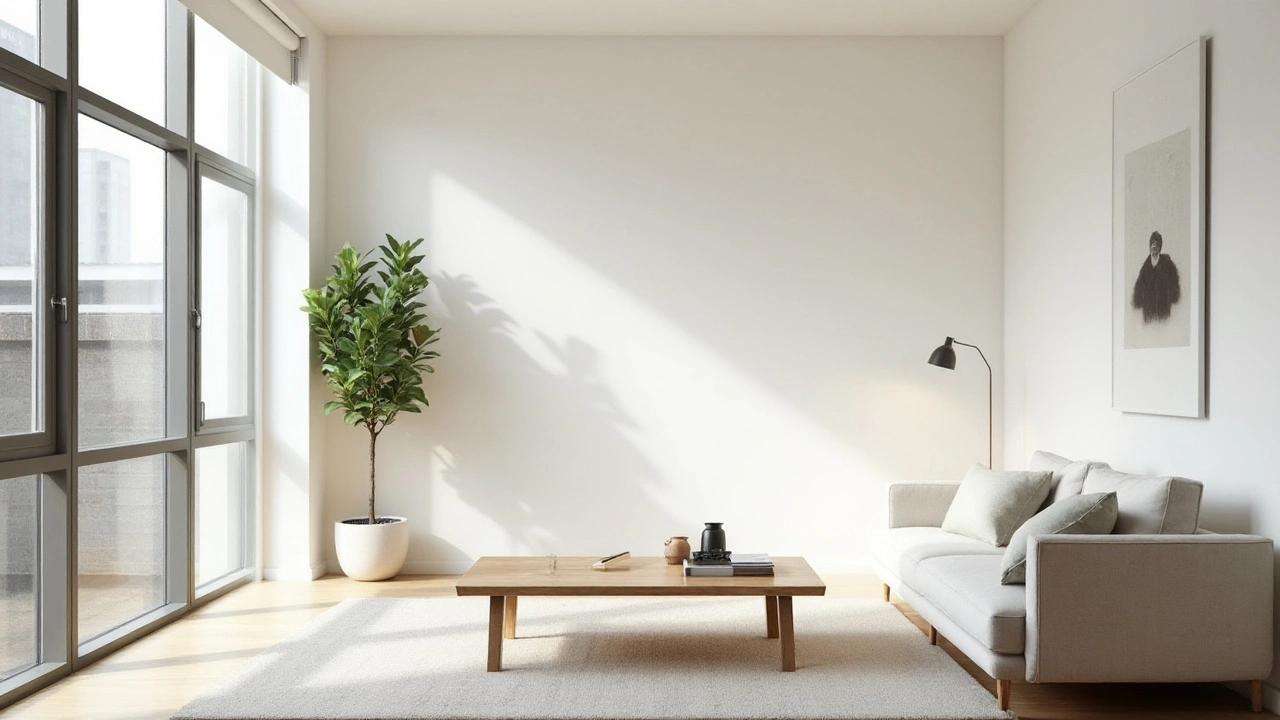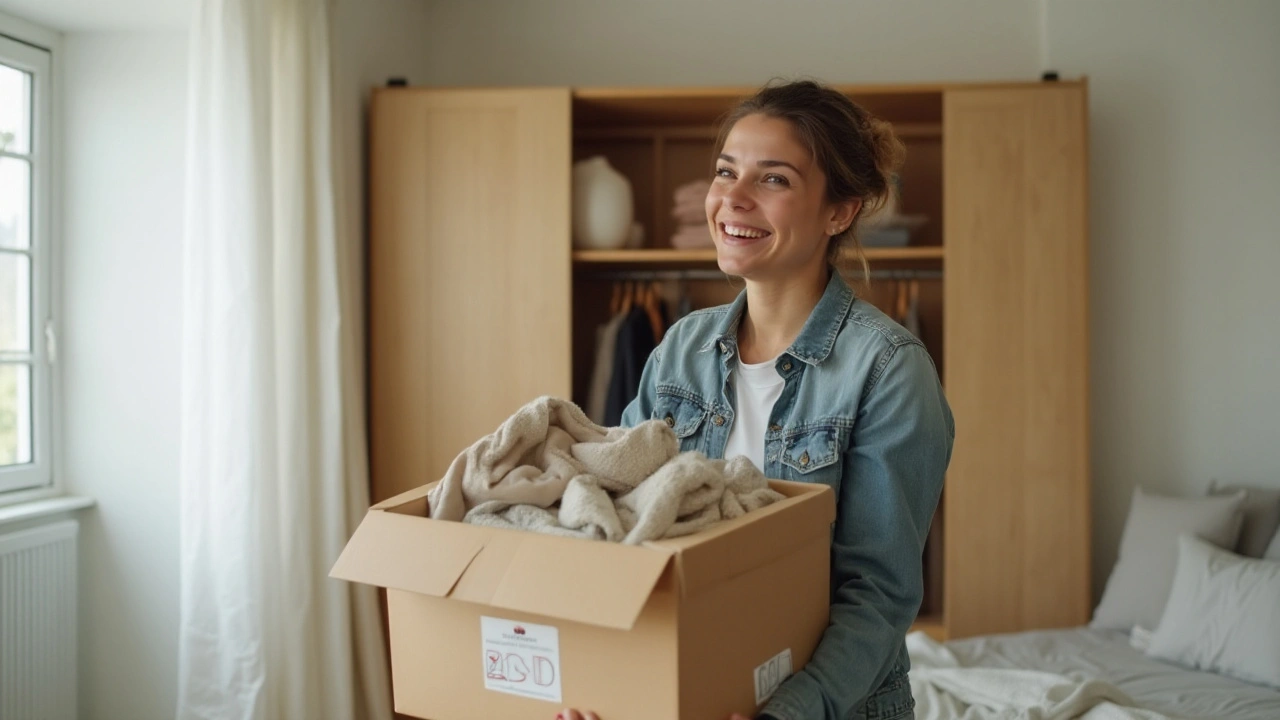Embrace Simple Living: The Power of Letting Go of Excess
 Sep, 14 2024
Sep, 14 2024
Have you ever felt overwhelmed by the clutter and chaos in your life? It may be time to consider minimalism as a solution. Minimalism isn’t just about getting rid of stuff; it’s about making room for what brings true value and joy. By choosing quality over quantity and focusing on meaningful experiences, you can transform your space and your wellbeing.
Throughout this article, we’ll explore what minimalism truly means, the substantial benefits it can bring, and practical steps for starting your journey. You don't need to embrace extreme lifestyles to reap the rewards of minimal living. A few simple changes can make a big difference. Ready to dive in?
- Understanding Minimalism
- The Benefits of Minimalism
- Practical Tips for Decluttering
- Living a Minimalist Life
Understanding Minimalism
Minimalism is a lifestyle that invites individuals to live with intention, focusing on what truly matters and eliminating what doesn’t. It’s not just about aesthetics or reducing belongings to the bare minimum; it’s about making responsible choices that enhance the quality of life. This philosophy encourages people to prioritize time, energy, and resources toward what brings genuine happiness and fulfillment.
Historically, roots of minimalism can be traced back to various cultural and religious traditions that emphasized simplicity and contentment. The Japanese concept of 'Ma,' which means space or gap, has greatly influenced modern minimalism. This concept promotes the idea that space is as important as the objects in it. Ancient Greek philosophy, too, upheld principles that align with minimal living.
Defining Minimalism
At its core, minimalism is about removing the non-essential items from your life to make space for what truly makes you happy. This can apply to various aspects: from physical belongings to mental clutter, relationships, and even time management. Marie Kondo's famous method of decluttering, asking whether an item sparks joy, is a widely known approach to minimalism. By this method, you're encouraged to keep only what adds real value to your life.
Joshua Becker, a known voice in the minimalism community and author of 'The Minimalist Home,' has said, "Minimalism is the intentional promotion of the things we most value and the removal of everything that distracts us from it."
In effect, minimalism encourages mindfulness. By only allowing room for things and activities that you genuinely care for, it helps reduce stress and increases focus. Living a simpler life can help break the cycle of consumerism. It helps you develop a clear understanding of your genuine wants and needs, steering away from materialistic distractions. The emphasis is on quality rather than quantity—owning fewer, yet more meaningful and high-quality items.
Modern Minimalism
In today’s fast-paced world, the minimalism movement has gained significant traction as more individuals seek to combat the overwhelming effects of consumer culture. Digital minimalism is another facet gaining popularity. As we spend more time on our devices, curating our digital space becomes just as crucial. Tidying up your email inbox, limiting social media usage, and organizing digital files can contribute to a more streamlined life.
Minimalism extends beyond personal spaces and digital realms; it also influences sustainable living. By opting for a minimalist lifestyle, individuals indirectly contribute to environmental conservation. Consuming less means producing less waste. Choosing quality, long-lasting products over disposable items helps reduce ecological footprints. Thus, minimalism not only benefits personal well-being but also has positive environmental impacts.
To sum up, minimalism is about intentionally shaping a lifestyle that aligns with your values and aspirations. It calls for the continuous practice of decluttering, prioritizing, and focusing on what genuinely matters. This way of living has gained modern relevance as an antidote to the stress and chaos of today's material-driven society, steering both individuals and communities toward a more thoughtful and fulfilling existence.

The Benefits of Minimalism
Living a minimalist lifestyle comes with a treasure trove of benefits. At its core, minimalism is about more than just letting go of material possessions; it's a paradigm shift that emphasizes the importance of quality over quantity. This shift can lead to profound changes in various aspects of life.
One of the most immediate benefits of minimalism is reduced stress. Clutter and an abundance of belongings can create a chaotic environment that contributes to feelings of overwhelm and anxiety. By decluttering and organizing your space, you simplify your surroundings, which can have a calming effect on your mind. It’s no secret that a tidy space can promote a sense of peace and order.
Another compelling benefit is financial freedom. When you adopt minimalist principles, you become more mindful of your spending habits. By prioritizing needs over wants, you’re less likely to make impulse purchases or accumulate debt. This shift can lead to significant savings and a healthier financial outlook. In a world where consumerism is rampant, embracing minimalism can be an act of financial liberation.
Minimalism also fosters better relationships. When you let go of excess, you make space—both physically and emotionally—for connections with the people who matter most. By focusing on experiences rather than things, you create opportunities for meaningful interactions with family and friends. For example, hosting a dinner party becomes less about the fancy table setting and more about the conversation and connection.
Additionally, minimalism can enhance productivity and focus. A cluttered workspace often leads to a cluttered mind. When you clear out unnecessary items and distractions, you create a more conducive environment for getting work done. This can lead to increased efficiency and better quality of work. Imagine how much more you can accomplish when your mind isn't bogged down by unnecessary distractions.
Environmental benefits are another vital aspect of minimalism. By consuming less and living more intentionally, you reduce your ecological footprint. This means fewer resources are being used and less waste is being produced. Choosing sustainable and durable items over disposable ones can contribute significantly to environmental conservation.
"Minimalism is not about having less, it's about making room for more of what matters." — Cait Flanders
Ironically, despite minimizing possessions, minimalists often report a greater sense of abundance and gratitude in their lives. When you focus on what you have, rather than what you lack, you cultivate a mindset of appreciation. This shift can lead to increased happiness and satisfaction. Interestingly, there’s a growing body of research suggesting that experiences make us happier than material things. By focusing on experiences and relationships, minimalism aligns well with this idea.
Health Benefits
Minimalism also has notable health benefits. When your surroundings are less cluttered, you’re likely to feel less overwhelmed, which can have a positive impact on your mental health. Additionally, a minimalist lifestyle often encourages healthier habits, such as cooking at home more often, which can lead to improved physical health. Preparing meals at home allows for better control over ingredients and portion sizes, contributing to better nutrition and overall wellness.
In summary, embracing minimalism can profoundly improve various aspects of your life, ranging from stress reduction and financial freedom to enhanced relationships and environmental conservation. The benefits are far-reaching and can lead to a more fulfilling, meaningful existence. If you’ve been contemplating making a change, minimalism might just be the path to a transformed life.

Living a Minimalist Life
Embracing a minimalist lifestyle is not about deprivation. Instead, it's about making conscious choices to focus your life on what matters most. It's astonishing how this simple shift in mindset can lead to a more fulfilling life. Many successful minimalists emphasize that reducing excess allows you to enjoy your surroundings and find contentment in simplicity.
One of the initial steps in living simply is to assess every item you own. Look around your home and notice the items that truly add value to your life. Do you really need five sets of dinnerware or an overflowing wardrobe? Keep what you love and let go of the rest. According to studies, people who declutter often report a surge in happiness and less anxiety.
The benefits of a simple living lifestyle are plentiful. A decluttered space often leads to a decluttered mind. With fewer distractions, you can focus better and increase your productivity. You’ll find that cleaning and organizing become easier tasks without the burden of excess possessions. Moreover, minimalism can also positively affect your finances. By cutting down on unnecessary purchases, you save money and can invest in experiences that enrich your life, such as travel or hobbies.
Practical steps in adopting this lifestyle include starting small. Focus on one area of your home, such as your closet. Remove anything that hasn’t been worn in the last year. Marie Kondo, a well-known organizing consultant, suggests keeping items that “spark joy”. It’s a fantastic metric to gauge what stays and what goes. Minimize your digital clutter next. Unsubscribe from emails, remove apps you don’t use, and keep your digital files organized.
Living minimally also means being mindful of what comes into your home. Adopt a one-in-one-out rule: for every new item you bring in, remove one. This helps maintain a balance and prevents clutter from creeping back into your life. A minimalist approach to food can also be beneficial. Planning meals and buying only what you need reduces waste and encourages healthier eating habits.
Minimalism extends beyond physical possessions—it’s a mindset. Some minimalists practice mindfulness and meditation to help keep themselves grounded. Meditation apps and guided sessions can transform your routine. Being present and appreciating the moment can create a more peaceful life. Moreover, spend time in nature. Research shows that being outdoors can reduce stress and improve mood.
Building a community around minimalism can provide support and shared experiences. Online forums, local groups, or even friends can offer tips and inspiration. It’s easier to stay committed to decluttering and simplifying when you know others are on the same path. Likewise, sharing your journey can motivate others.
Remember, minimalism doesn’t look the same for everyone. It’s about what works for you and your family. For example, my kids, Lewis and Seraphina, have embraced the minimalist mindset by focusing on quality toys they truly enjoy, rather than amassing many they rarely use. It’s a personal journey that evolves with time.
Joshua Becker, a leading voice in the minimalist movement, once said, “Minimalism is the intentional promotion of the things we most value and the removal of anything that distracts us from it.”
Incorporate minimalism into your life one step at a time. Celebrate small victories, and don’t be discouraged by setbacks. Your journey toward simple living is personal and unique. By letting go of excess, you'll create space for the things that truly matter, enriching your life in countless ways.